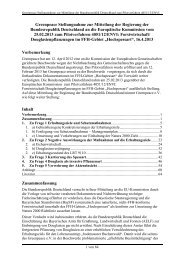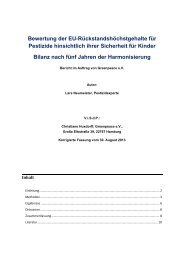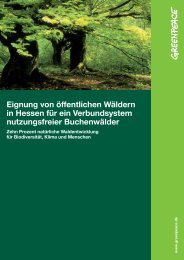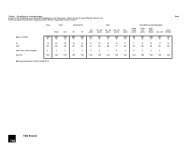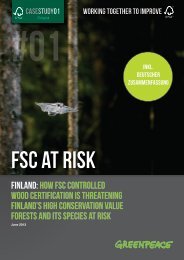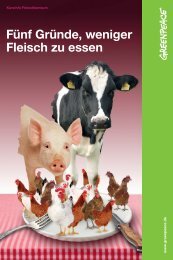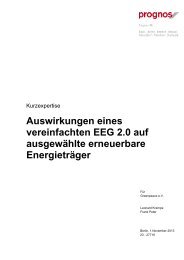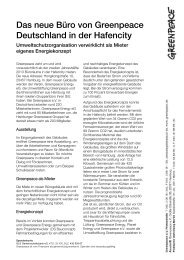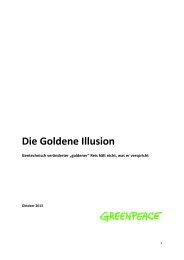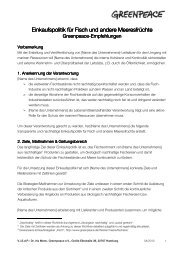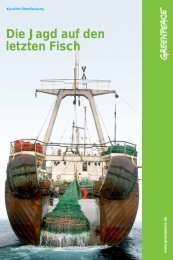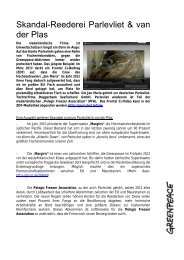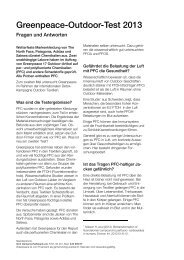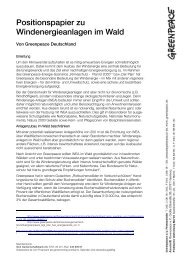Umweltverbrechen multinationaler Konzerne - Greenpeace
Umweltverbrechen multinationaler Konzerne - Greenpeace
Umweltverbrechen multinationaler Konzerne - Greenpeace
Erfolgreiche ePaper selbst erstellen
Machen Sie aus Ihren PDF Publikationen ein blätterbares Flipbook mit unserer einzigartigen Google optimierten e-Paper Software.
industry. In December 2000, unimpressed with Aventis’ ‘new data’,<br />
the EPA Scientific Advisory Panel refused to recommend that EPA<br />
grant the company’s request. The scientists found that the Cry9C<br />
protein in StarLink poses a “medium likelihood” of being an allergen.<br />
Food producers also unsuccessfully lobbied the US Food and Drug<br />
Administration (FDA), which shares responsibility for gene-spliced<br />
foods, to declare StarLink an "unavoidable contaminant" in the<br />
human food supply because it has apparently been mixed with so<br />
much other maize. 203<br />
Aventis announced that it was halting sales of StarLink maize<br />
hybrids for 2001 204 , but it is unclear how Aventis handled farmers<br />
who had already ordered or had 2001 contracts that involved<br />
StarLink seed. In March 2001, the USDA said that StarLink<br />
contamination had been detected in non-StarLink seed intended for<br />
sale in 2001.<br />
US maize and maize products are traded globally and shipped to<br />
countries in Asia, Latin America, Africa and Europe. The majority of<br />
countries receiving or importing US maize had – and still have – no<br />
means or capacity to test for the presence of StarLink contamination<br />
in US shipments. The US did not take any measures to ensure its<br />
maize exports were free of StarLink contamination. Such a system<br />
was only set up for very few countries, such as Japan. On 27<br />
October, 2000, the US government lifted restrictions on the export of<br />
StarLink maize. In a notice to US exporters, the USDA, the FDA and<br />
the EPA said StarLink could be exported as long as it was specified<br />
to be used for feed and industrial uses only.<br />
Aventis agreed to stop growing StarLink maize in the US in the future<br />
by cancelling its EPA registration for the maize. Despite the buyback<br />
and the recall of food products in the United States, Aventis<br />
said it still had big plans to develop StarLink in other maize-growing<br />
countries 205 .<br />
Legal outcome In March 2002, a federal judge said he would approve a USD 9<br />
million settlement of a class- action lawsuit filed by consumers<br />
against several major food companies that sold products containing<br />
StarLink maize. The lawsuit also includes Aventis and Garst Seed,<br />
which sold seed contaminated with StarLink maize. A settlement in<br />
this class-action lawsuit has Aventis apparently paying the full<br />
amount of USD 9 million. Aventis said that while it denies any<br />
liability for the claims made in the suit, it believes the settlement is<br />
the best possible way to move forward 206 .<br />
Further legal wrangling is expected over responsibility for<br />
unauthorised uses of StarLink maize. Government officials said<br />
Aventis failed to make sure that the maize was grown with buffers<br />
that would prevent cross-pollination and other restrictions that were<br />
203 Biotech maize found in another brand of taco shells-groups, Reuters, 25 October 2000.<br />
204 Aventis statement, 26 September 2000.<br />
205 StarLink maize was grown in other countries, Reuters, 31 October 2000.<br />
206 Supermarket News, 18 March 2002.<br />
98



